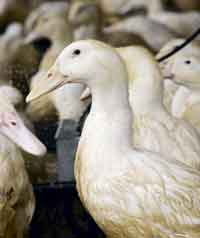Duck eggs implicated in UK salmonella outbreak

Duck eggs and duck products have been implicated in a national outbreak of salmonella food poisoning which, the Health Protection Agency says, has led to the hospitalisation of two people and the death of one.
The outbreak involves the serotype Salmonella typhimurium DT8, a strain which is often associated with ducks.
According to the HPA, there have been 63 reports of human infection in England and Northern Ireland this year, compared with 47 in 2009 and 34 in 2008. Common symptoms include diarrhoea, vomiting and stomach cramps.
“As soon as we first noticed an increase we started detailed investigations, interviewing cases to find the common cause of illness and to identify the source of the outbreak,” said the HPA’s Dilys Morgan.
“It became clear from our investigations that the increase was related to the consumption of duck products, mainly eggs.”
A spokeswoman for the HPA said there had been an acceleration in the number of salmonella cases over the summer months, “something we had not seen before”, with the greatest concentration in the south-east and north-west of the country. She added that the cases related to commercial flocks of ducks, not backyard flocks.
The Food Standards Agency has subsequently issued a statement reminding consumers and caterers of the importance of good hygiene when handling and preparing duck eggs.
“Duck eggs may occasionally be contaminated with salmonella, both on their shells or, more rarely, internally,” it said. “Duck eggs should be cooked thoroughly until both the white and yolk are solid.”
Melandy Daniels, who manages the country’s largest duck egg supplier, Watercress Lane in Norfolk, said the outbreak highlighted the need for tighter production controls to guarantee consumer safety.
“Watercress Lane believes that a duck egg equivalent of the British Lion mark is now vital to regulate production and protect the public,” she said. “If every producer operated under stringent controls similar to those we have developed with our Blue Duck accreditation (which includes vaccination), then this outbreak would have been far less likely to have happened.”
Robert Davies of the Veterinary Laboratories Agency told Farmers Weekly that Salmonella typhimurium DT8 was often associated with ducks and was more prominent at this time of year, given the weather and the movement of birds.
